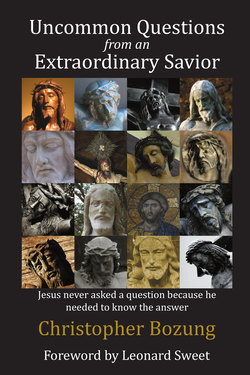Читать книгу Uncommon Questions from an Extraordinary Savior - Christopher Bozung - Страница 6
На сайте Литреса книга снята с продажи.
ОглавлениеIntroduction
In Chicago, March 1992, an 8-year-old boy was questioned by police after he shot a girl classmate in the spine with a semiautomatic handgun. “Is this going to take long?” he asked the detectives, “I’ve got someplace to go tonight.”1
Questions define our thoughts. They are used to attract the attention of the listener and prejudice responses. They help us to build our understanding of a subject or idea. Yet not all questions challenge us in the same way. Open-ended questions require much thought. Closed-ended questions require a simple “yes” or “no.” Rhetorical questions have self-evident answers. Hypothetical questions ask us to begin the process of thinking and answering.
Have you ever noticed how many questions you ask in a day – or perhaps someone asks you?
In just one hour’s time, my son Christian asked me, “Why are your lips red? Where does your tongue go when you close your mouth? How do they make potato chips? Why do we only have ten fingers?” My daughter Arriana – who tends to be more pragmatic – asked me, “Do old people take a shower?”
Since I first began studying the questions of Jesus, I have collected questions people ask. Here are some of my favorites:
Why do they lock gas station rest rooms? Are they afraid someone will clean them?
Do vegetarians eat animal crackers?
Why isn’t there mouse-flavored cat food?
What was the best thing before sliced bread?
Two of the best questions, though, come from the presidential election of 1948 in which Governor Thomas Dewey lost to Harry S Truman. Paul Boller writes in Presidential Anecdotes, “Stunned by his defeat, Dewey later said he felt like the man who woke up to find himself inside a coffin with a lily in his hand and thought to himself: ‘If I’m alive, what am I doing here? And if I’m dead, why do I have to go to the bathroom?’”2
The pages of the New Testament contain some 340 individual questions Jesus asked. Such questions as:
“Why were you searching for me?” “Didn’t you know that I had to be in my Father’s house?” “Who are my mother and my brothers?”
“Now which of them will love him more?” “Simon son of John, do you truly love me?”
“Why are you so afraid?” “Do you still have no faith?”
“Which is easier: to say, ‘Your sins are forgiven,’ or to say, ‘Get up and walk’?” “Do you want to get well?”
“Who do people say that I am?” “Why do you call me, ‘Lord, Lord,’ and do not do what I say?”
“What are you discussing together as you walk along?” “Did not the Christ have to suffer these things and then enter his glory?”
“What good will it be for a man if he gains the whole world, yet forfeits his soul?” “Or what can a man give in exchange for his soul?” “Friends, haven’t you any fish?”
“My God, my God, why have you forsaken me?”
These are questions formed on the lips of the very Son of God. Was he merely gathering facts or simply introducing a story? Did Jesus ask questions for the same reasons we ask them? Or is there more behind the questions of Jesus than meets the eye?
Jesus knew the hearts of man as only a Divine One can. His omniscience, his knowledge of the thoughts of those to whom he directed his questions – are characteristics that can never be duplicated by any mortal man.
The questions Jesus asked capture his thoughts about his own ministry, teachings, and dealings with both man and God. His ability to ask the right question at the right moment for the right need will be unmatched by anyone. His questions can only be mimicked in a crude fashion. His skill in crafting a question to pierce the heart, to quicken the thoughts, to convict the conscience, to elicit faith – those are abilities that are only occasionally, if ever, stumbled upon in the discourse between men. His questions were truly unique because Jesus was unique. They are uncommon questions from an extraordinary Savior.
